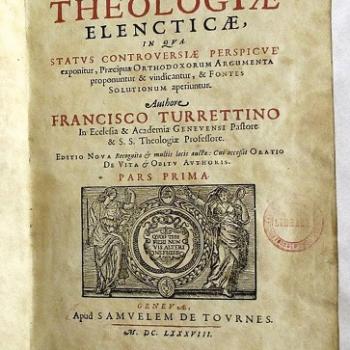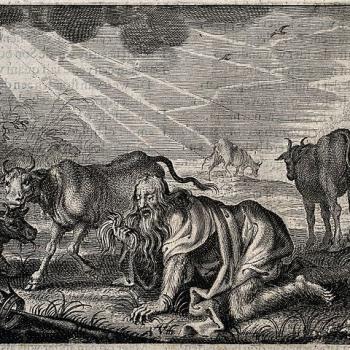
Ward Ricker is an atheist who (as so often) was formerly a self-described “fundamentalist”. He likes to poke holes in the Bible and “prove” that it is a terrible and “evil” book, not inspired, hopelessly contradictory, etc. He put together a 222-page book called Unholy Bible (2019): available for free as a pdf file. It contains 421 couplets of passages that he considers literally contradictory, and 256 more couplets of not technically contradictory but “problem” passages (according to him). Ward wrote in his book: “I . . . am including here only what I consider to be the more firm examples of contradictions. . . . I do not want to include examples that are ‘weak’ and will be easily refuted. I have made my best judgment.”
He issued a challenge for anyone to take on his alleged contradictions. After my first reply, he wrote a 5 1/2 page article suggesting in-depth dialogue. I responded, explaining in depth why I thought dialogue between us would be unfruitful, for many reasons. He then accused me (among other things in his two replies) of “hypocrisy” that “knows no bounds.” This is, of course, against my discussion rules, which forbids such rank insults, so he was promptly banned from my blog, and I replied: “I was exactly right in my judgment that no dialogue was possible. It never takes long for the fangs to come out if they are there.”
But I had already stated: “I may still take on several of your proposed contradictions, just so I can have opportunity to show how very wrong atheist contentions are (which is one thing Christian apologists do).” This series represents that effort. Mr. Ricker can respond on his page as he sees fit. He can still see my posts. His words will be in blue. To search any of this series on my blog, paste “Ward’s Whoppers #” in the search bar on the top right of my blog page. He uses the King James Version for his Bible verses. I will use RSV in my replies.
*****
17. **
Genesis 16: 15 And Hagar bare Abram a son: and Abram called his son’s name, which Hagar bare, Ishmael. 1 Chronicles 1: 28 The sons of Abraham; Isaac, and Ishmael.
Vs:
Genesis 22: 1 And it came to pass after these things, that God did tempt Abraham, and said unto him, Abraham: and he said, Behold, here I am. 2 And he said, Take now thy son, thine only son Isaac, whom thou lovest, and get thee into the land of Moriah; and offer him there for a burnt offering upon one of the mountains which I will tell thee of.
Hebrews 11: 17 By faith Abraham, when he was tried, offered up Isaac: and he that had received the promises offered up his only begotten son
Q: Was Isaac Abraham’s only son or did he have another one? (Note: Ishmael was born before Isaac.)
***
Apologist Kyle Butt (“One Little Word,” Apologetics Press, 2002) observed:
Abraham fathered Ishmael by Hagar (Genesis 16:16) more than a decade before the birth of Isaac. And following the death of Sarah, Abraham took Keturah as a wife, by which he begat at least six more sons (Genesis 25:1-2). . . .
In the Greek text of Hebrews 11:17, the word translated as “only begotten son” is monogenes. While this word could possibly be used to refer to an only child, that certainly was not its sole use. Josephus used the word monogenes to refer to Izates, who had an older brother and several younger brothers (Antiquities, 20.2.1). The well-respected Greek-English Lexicon by Arndt, Gingrich, and Danker explains that the word can be used to denote something that is “unique (in kind), of something that is the only example of its category” (1979, p.527). This meaning fits perfectly the passage in Hebrews 11, where the writer was explaining that Abraham offered up his “only promised son.” Abraham had no other children that fit in the category of being promised by God. Isaac was the only “example of a category”—that category being a son who was promised to Abraham and Sarah.
But what to make of Genesis 22:1? I think it is plausible to hold that it was referring to his only son from a non-concubine wife, or the only promised son; or the only legal heir (“through Isaac shall your descendants be named”: Gen 21:12; cf. Jud 11:2; Rom 9:7; Gal 4:30); possibly even (though I think it’s much less likely) “the only son at the time of writing after he was called Abraham rather than Abram.”
The Hebrew usage of “first-born” is also perhaps analogous and instructive, and illustrates that such phrases about family members are not always intended or understood as absolutely literal (certainly, not nearly as much as we are literal about such terms in our culture). The primary meaning of “first-born” was “preeminent.”
Hence, David is called “first-born” in Psalm 89:27, not because he was the literal first child of Jesse (for he was the youngest), but in the sense of his ascendancy to the kingship of Israel. Likewise, Jeremiah 31:9 refers to Ephraim as the “first-born,” whereas Manasseh was actually the first child born (Gen 41:50-52).
As a second example of such acceptable ancient Hebrew “looseness” of “family terminology,” we might look at how “brother” was not infrequently used in a way other than “sibling”:
1) By comparing Genesis 14:14 with 11:26-27, we find that Lot, called Abraham’s “brother”, is actually his nephew.
2) Likewise, Jacob is called the “brother” of his Uncle Laban (Gen 29:10, 15).
3) Cis and Eleazar are described as “brethren”, whereas they are literally cousins (1 Chr 23:21-2).
4) By comparing Matthew 27:56; Mark 15:40; and John 19:25, we find that James and Joseph – mentioned in Matthew 13:55 with Simon and Jude as Jesus’ “brethren” – are also called sons of Mary, wife of Clopas. Thus in this usage it apparently means “cousins” or more distant relative; but it cannot logically mean “siblings.”
Thus “brother” could mean (literally) “nephew” or “cousin.” Given all these evidences of the Hebrew understanding of descriptions of relatives, “only son” in Genesis 22:1 quite plausibly could mean something other than “absolutely only biological son of Abraham.” The meaning — all these things considered — is most likely “preeminent son” or “heir” or “son of the promise” (see Rom 9:8-9; Gal 4:22-23, 28).
***
Photo credit: The banishment of Hagar and Ishmael (c. 1697), by Adriaen van der Werff (1659-1722) [public domain / Wikimedia Commons]
***













